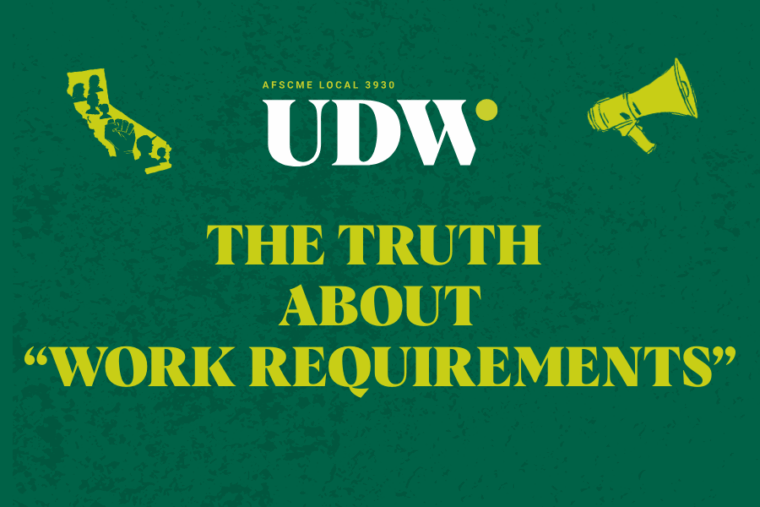We’ve seen it before: Politicians saying they’re cracking down on “fraud,” “cutting waste,” or “cutting government spending,” but we know what that really means. It means cuts to vital programs, such as Medicaid, which means decreases in IHSS hours and working people being punished just for needing help, while companies reap the benefits and tax cuts.
Now, some members of Congress are pushing for “work requirements” as part of massive changes to Medicaid, known as Medi-Cal here in California. And make no mistake: this is a direct threat to IHSS providers and the clients we care for.
What Are Work Requirements?
Work requirements are rules that say people must prove they are working a certain number of hours in order to stay enrolled in Medicaid. If they don’t submit paperwork, or don’t meet the hours—even if it’s due to caregiving, health issues, or part-time jobs—they can lose their coverage.
The truth is, most people on Medicaid are already working, or they can’t work because they are:
- Taking care of loved ones
- Living with disabilities
- Elderly and retired
- In between jobs or working unstable hours
So why push work requirements? It’s not about encouraging work. It’s about making it harder to get care.
We’ve Been Here Before—And We Know the Damage It Does
Back in 2009, Governor Schwarzenegger claimed the IHSS program was “riddled with fraud.” What followed were policies that treated caregivers like criminals: mandatory fingerprinting, surprise home visits, and fines for simple timesheet mistakes.
These policies didn’t stop fraud. They just made life harder for care workers and our clients. We fought back then—and we won.
Now it’s happening again, just with new language. “Work requirements” are just another way to:
- Push people off Medi-Cal
- Shrink IHSS funding
- Undermine the care millions of Californians rely on
At the end of the day, this is just another way to cover-up the fact that they are making cuts to Medicaid and punishing low-income communities across the country.
How Would Work Requirements Impact IHSS Providers and Family Child Care Providers?
IHSS providers are already working—providing critical care that keeps people safe in their homes. Family child care providers are doing the same—supporting working families and helping children grow and thrive. But under work requirements:
- Many providers could lose Medi-Cal coverage, especially if we don’t meet strict, outdated definitions of “work” or miss a paperwork deadline.
- Parents who rely on Medi-Cal for their children’s health needs could lose coverage—putting stress on families already struggling to afford child care.
- Cuts to Medicaid could lead to lower funding for programs that support child care and early education, and fewer resources for families who need them most.
- Cuts to Medicaid could force California to slash IHSS hours, lower wages, or even eliminate jobs.
- Could lead to hospital closures, especially those in rural areas, and massive lay offs, increasing wait times and driving up the cost of healthcare
We’re not talking about policy debates or numbers on a spreadsheet. We’re talking about real lives, real care, and real consequences.
Who Loses the Most?
Over 15 million Californians rely on Medicaid. That’s 1 in 3 people. It includes:
- 1 in 5 seniors
- 4 in 10 children
- 1 in 2 Latino residents
In places like CA-40 (Rep. Young Kim) and CA-22 (Rep. David Valadao), thousands of IHSS providers and clients would be affected. Cuts wouldn’t “reduce waste.” They would eliminate care.
The Bottom Line
IHSS providers are working people. We do one of the most essential jobs in California—caring for those who need help the most. We deserve respect, not punishment.
We must say NO to work requirements.
We must say NO TO MEDICAID CUTS.
Take Action
- Call your Congressperson — Dial 1-866-584-5792 and tell them to protect Medicaid and to take a stand against any cuts or changes that would devastate working families across the country.
- Share your story — Tell us what Medi-Cal means to you.
- Join us in our fight — Together, we are stronger, live better, and fight to win. Call your local office and find out how you can get involved in our local actions.
